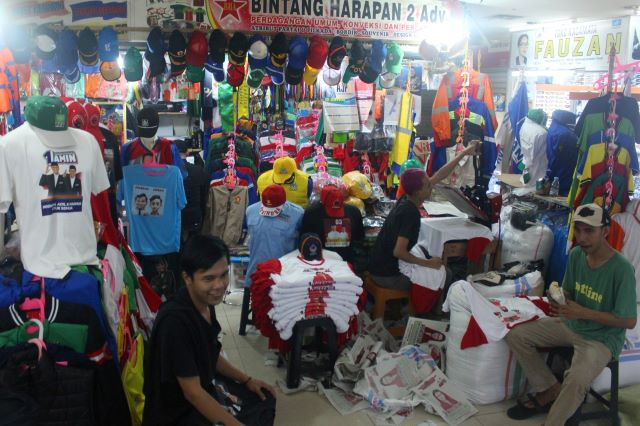ITE law spreads fear in democracy
Furqan Ermansyah, known as Rudy Lombok, was indicted for a 10-month jail sentence for insulting and defaming officials of the West Nusa Tenggara provincial administration, in violation of Article 27 and Article 1 of the Law No
Change Size

F
urqan Ermansyah, known as Rudy Lombok, was indicted for a 10-month jail sentence for insulting and defaming officials of the West Nusa Tenggara provincial administration, in violation of Article 27 and Article 1 of the Law No.11/2008 on Electronic Information and Transactions (ITE Law) at the Lombok District Court on Dec. 10.
The number of citizens prosecuted under the law has increased almost seven-fold in the last eight years, according to the Southeast Asia Freedom of Expression Network (SAFEnet) in 2015.
While the number is relatively small, this represents an important restriction on citizens' freedom. Several countries in Southeast Asia, including Singapore, Malaysia and Thailand still experience restrictions on freedom of expression and opinion. Indonesia is recognized as the third-largest democratic country, yet there is still a marked fear among the young to take part in the online world.
'It is frightening to give opinions especially about politics online because the ITE Law can put us in jail,' is an often-heard statement in Jakarta discussion circles, referring to the law that was enacted in 2008.
This fear stems from several cases, like those of housewife Prita Mulyasari in 2009, Benny Handoko in 2014, housewife Ervani Emi Handayani in 2014, graduate student Florence Sihombing in 2014, satay kiosk worker Muhammad Arsyad in 2014 and many more.
Damar Juniarto, the regional coordinator of SAFEnet, said the number of cases went up from seven to 20 in 2013. The number doubled to 41 cases in 2014 and 44 cases in 2015. Overall, there have been 125 cases linked to the law in the last seven years.
... digital media technologies have become a potential element of civic and political life ...
A vibrant public sphere is essential for a healthy democracy and the online media encourages the creation of a public sphere that sustains democracy, as scholars have said.
The public sphere is essential to everyone, as every citizen can exchange ideas, obtain knowledge and information, confront public concerns, practice public accountability, discuss policy choices, challenge elites without reprisal and defend principles.
In a recent discussion a student activist said, 'I am interested in political and humanity issues, but I do not want to discuss them because it is not safe for me; many have been charged with crimes by the ITE Law, such as students, housewives, regular people ['¦] I do not want to get caught by the police.'
The future of democracy is in young people's hands.
The student movement in 1998, for example, was instrumental in the people's power movement that forced Soeharto's resignation from the presidency. Student activists used the internet to mobilize, to coordinate and to provide the information to support that reform movement, as illustrated by researchers David Hill and Krishna Sen.
Today opportunities for participation are wide open. There has been massive growth in internet use in Indonesia over the past decade, with 49 percent of internet users between 18 and 25 years old, according to latest figures of the University of Indonesia and the Association of Indonesian Internet Providers (APJII).
Ironically, the fear factor has crept in.
Anwari Natari, program manager of Satu Dunia (OneWorld-Indonesia) shared the 2014 presidential election in a public discussion report entitled 'Threat of ITE Law for civic voices in simultaneous regional elections' in early December. He aided some young volunteers who were afraid to report election cheating.
'Democratic deficit' occurs when citizens withdraw from civic engagement and political participation. Online media tools are changing the balance of spectatorship and participation. Digital media enables users to become content sources and receivers at the same time. More people are able to produce the information or content by digital media, such a shift that requires digital media literacy.
Researcher Terry Flew describes digital media literacy as not only the simple development of interpretive skills or contextual awareness, but also a series of digital production skills that include 'the ability to create, to be critical and to contribute as well as to consume' digital content.
Another important part of digital media literacy in relation to civic and political process is a youthful approach to promote online civic and political engagement in society. This is because, nowadays, digital media technologies have become a potential element of civic and political life, in particular for young people.
Schools and communities have to transform themselves to become digital literacy and democratic educators to prepare the young for a future role in democratic societies.
The government has to protect its citizens and in a democratic country the laws are made to govern, not to control their citizens. Therefore, anyone can freely create, express and participate in civic engagement and political participation.
The Digital Democracy Forum has pushed the Indonesian government to revise Article 27 of the law.
Indonesia needs laws to protect its citizens, not ones that criminalize them for freedom of expression.
________________
The writer is a member of the Digital Media Research Center at Queensland University of Technology, Brisbane, where she is a PhD candidate and sessional academic staff member in media and communications.









